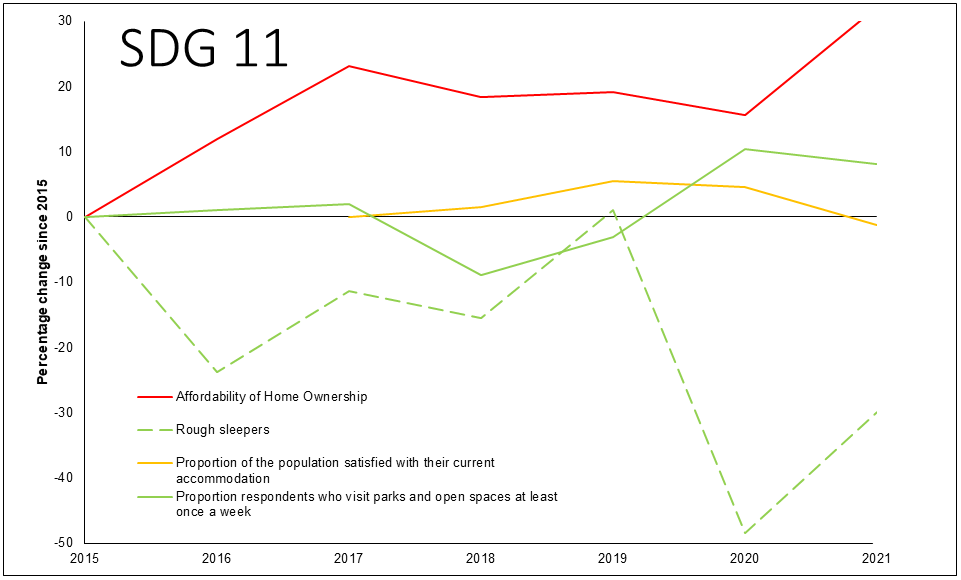SDG 11: Sustainable cities and communities
What does the data show?
Homelessness
While homelessness is difficult to assess statistically, recent data is concerning. Between 2015 and 2019 there was effectively no change in the number of persons sleeping rough in the annual autumn count (97 vs 98), then a significant drop in 2020 (50). This is partly explained by the government’s ‘Everyone In’ policy which provided hotel rooms for rough sleepers during COVID lockdowns.
However, the number increased in 2021 to 68. Data on statutory homelessness suggests that the number of households per 1,000 assessed as homeless doubled between 2019 and 2021. Rising rents and a worsening ratio of housing costs to income (housing affordability index) is making households more vulnerable.
Air quality
Air quality is an issue experienced disproportionately by disadvantaged communities. Annual mean levels of particulate matter show improvements: in 2021 the mean levels of PM2.5 were at their lowest level ever recorded at 8.33 μg/m3, down from 10.25 in 2015 μg/m3. PM10 levels have fluctuated with a gradual decrease since 2012.
SDG 11: Sustainable cities and communities
Data on statutory homelessness suggests that the number of households per 1,000 assessed as homeless doubled between 2019 and 2021.
Annual levels of particulate matter are decreasing and the proportion of people accessing green spaces has grown since 2015, which may have been amplified by the pandemic. However, poor air quality remains an issue experienced disproportionately by disadvantaged communities.
Buses and green spaces
As noted in SDG 9: Industry, innovation and infrastructure , data on the use of bus services is limited, in part because of the impact of the pandemic on bus patronage. The proportion of people accessing green spaces has grown since 2015, which may have been amplified by the pandemic.
What Bristol is doing
Tailored help for those experiencing homelessness
Bristol City Council commissions a range of services with partners to ensure tailored provision for those facing and experiencing homelessness. This includes specific services to support women, young people, vulnerable parents, people with mental health issues and those dealing with drug and alcohol abuse issues.
Alongside this, there are numerous organisations in the city, such as Help Bristol’s Homeless, which attempt to tackle homelessness through community-centred strategies, including accommodation centres that provide temporary housing and food.
Affordable, sustainable housing
Bristol City Council and the Bristol Housing Festival are working in partnership with UN-Habitat and Nesta Challenges on the Climate Smart Cities Challenge. The challenge aims to convene innovators from across the city, nation and world to find a financial solution to the issue of building affordable and sustainable housing in Bristol. If successful, this project could change the way housing in the city is valued, providing new avenues for delivering sustainable, biodiverse and affordable housing.
The Bristol Housing Festival has also partnered with Bristol City Council and YMCA to deliver zero-carbon social rent housing for young people at risk of homelessness. In redeploying space above a car park, this project also helped improve the efficiency of space usage in the city.
Local economic development trends
